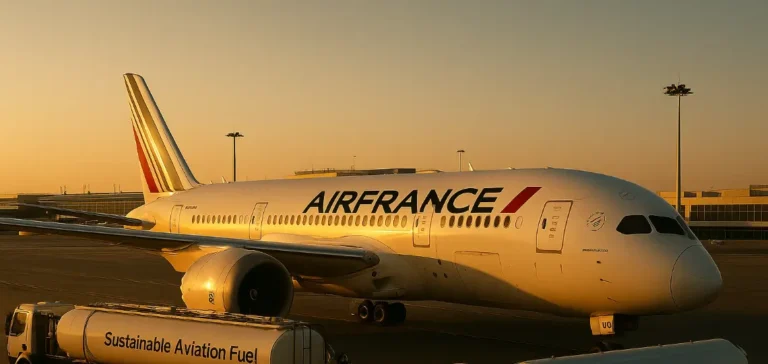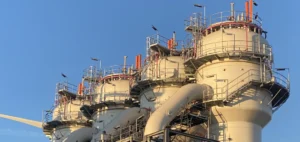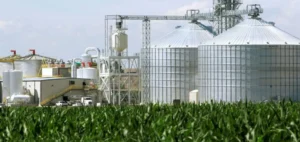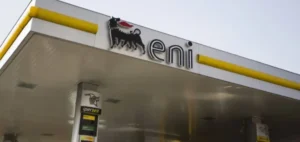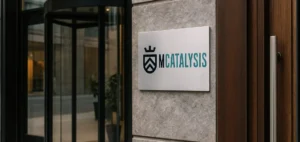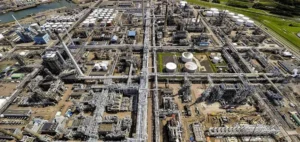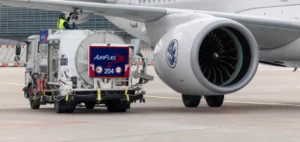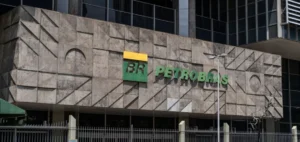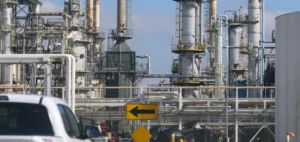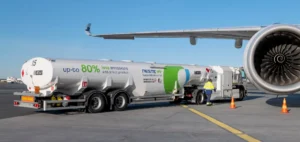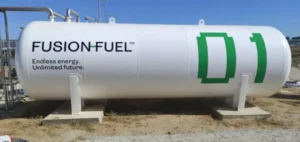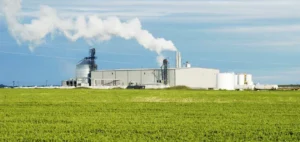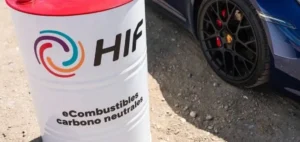The Sustainable Aviation Fuels (SAF) section of the Strategic Contract for the New Energy Systems Sector (Contrat Stratégique de Filière Nouveaux Systèmes Énergétiques – CSF NSE) was officially signed by Ministers Éric Lombard, Marc Ferracci, and Philippe Tabarot, along with industrial leaders, trade union representatives, and aviation industry executives. This section defines a concrete roadmap for the period 2024-2027, focusing on establishing a sovereign, competitive, and sustainable industrial sector. Four priorities structure this plan: increasing national production capacity, ensuring product competitiveness and compliance, creating favorable conditions for industrial investment, and launching significant initial projects before 2030. The aim is notably to fully satisfy French demand for SAF while exploring export opportunities.
Industrial objectives for 2030
France aims to achieve autonomy in sustainable aviation fuels, incorporating both biofuels and synthetic fuels produced from renewable hydrogen and captured carbon dioxide (eSAF and ebioSAF). The government intends to facilitate the Final Investment Decisions (FID), crucial for structuring this emerging sector. Planned measures include making suitable land available for industrial sites and providing enhanced support for projects deemed strategic by the French government.
Moreover, to maintain a fair market, the government plans to implement strengthened control mechanisms on fuel imports, ensuring their compliance with sustainability standards set by France and the European Union. This regulation aims to support the competitiveness of French companies on national and international markets.
European framework and industrial constraints
This French initiative aligns with the European Union’s carbon neutrality goals for 2050. The European regulation ReFuelEU Aviation thus obligates airlines to progressively increase the share of sustainable fuels in their overall fuel consumption for flights departing from European airports. While fleet renewal and operational improvements help reduce emissions, SAF are identified as the primary tool to achieve these ambitious objectives.
The French industry has already started this shift, with several domestic refineries actively producing aviation biofuels. Four new eSAF and ebioSAF production projects, recently selected under the CARB’AERO call for projects, benefit from substantial public support amounting to 100 million euros. These industrial initiatives are expected to significantly increase France’s synthetic fuel production capacity in the coming years.
Mobilization of industrial and institutional stakeholders
The signing of the SAF section of the CSF NSE brings together key players including TotalEnergies, Air France, Schneider Electric, and trade union representatives, working jointly on the development and consolidation of the national sector. This collective effort is supported by the French Ministries of Economy, Finance and Industrial and Digital Sovereignty, Industry and Energy, and Transport.
Participating companies underline the strategic importance of this sector to ensure both energy and industrial independence while strengthening the competitiveness of France’s aviation industry. Industry leaders notably plan to intensify investments in advanced facilities dedicated to producing sustainable fuels, leveraging France’s abundant low-carbon electricity.
Various stakeholders hope that this strategic framework will position France as a pioneer in an aviation industry facing increasing environmental and economic constraints. The challenge now is translating this roadmap into concrete industrial projects competitive in the global market.


